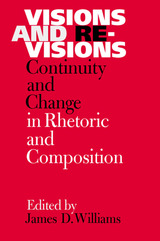
Tounderstand the history of "English," Ross Winterowd insists, one must understand how literary studies, composition-rhetoric studies, and influential textbooks interrelate. Stressing the interrelationship among these three forces, Winterowd presents a history of English studies in the university since the Enlightenment.
Winterowd’s history is unique in three ways. First, it tells the whole story of English studies: it does not separate the history of literary studies from that of composition-rhetoric studies, nor can it if it is going to be an authentic history. Second, it traces the massive influence on English studies exerted by textbooks such as Adventures in Literature, Understanding Poetry, English in Action, and the Harbrace College Handbook. Finally, Winterowd himself is very much a part of the story, a partisan with more than forty years of service to the discipline, not simply a disinterested scholar searching for the truth.
After demonstrating that literary studies and literary scholars are products of Romantic epistemology and values, Winterowd further invites controversy by reinterpreting the Romantic legacy inherited by English departments. His reinterpretation of major literary figures and theory, too, invites discussion, possibly argument. And by directly contradicting current histories of composition-rhetoric that allow for no points of contact with literature, Winterowd intensifies the argument by explaining the development of composition-rhetoric from the standpoint of literature and literary theory.

Using traditional and contemporary rhetorical theory, Winterowd argues that the fiction-nonfiction division of literature is unjustified and destructive.
He would bridge the gap between literary scholars and rhetoricians by including both fiction (imaginative literature) and nonfiction (literature of fact) in the canon. The actual difference in literary texts, he notes, lies not in their factuality but in their potential for eliciting an aesthetic response.
With speech act and rhetorical theory as a basis, Winterowd argues that presentational literature gains its power on the basis of its ethical and pathetic appeal, not because of its assertions or arguments.

A history of contemporary rhetoric, Visions and Revisions: Continuity and Change in Rhetoric and Composition examines the discipline’s emergence and development from the rise of new rhetoric in the late 1960s through the present. Editor James D. Williams has assembled nine essays from leading scholars to trace the origins of new rhetoric and examine current applications of genre studies, the rhetoric of science, the rhetoric of information, and the influence of liberal democracy on rhetoric in society.
Given the field’s diversity, a historical sketch cannot adopt a single perspective. Part one of Visions and Revisions therefore offers the detailed reminiscences of four pioneers in new rhetoric, while the essays in part two reflect on a variety of issues that have influenced (and continue to influence) current theory and practice. In light of the recent shift in focus of scholarly investigation toward theory, Williams’s collection contextualizes the underlying tension between theory and practice while stressing instruction of students as the most important dimension of rhetoric and composition today. Together, these chapters from some of the most influential scholars in the field provide a range of perspectives on the state of rhetoric and composition and illuminate the discipline’s development over the course of the last forty years.
READERS
Browse our collection.
PUBLISHERS
See BiblioVault's publisher services.
STUDENT SERVICES
Files for college accessibility offices.
UChicago Accessibility Resources
home | accessibility | search | about | contact us
BiblioVault ® 2001 - 2024
The University of Chicago Press









